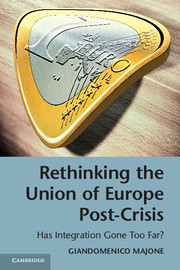Book contents
- Frontmatter
- Contents
- List of abbreviations
- Introduction: varieties of regional integration
- 1 Monetary union as a metaphor
- 2 A political culture of total optimism: its rise and fall
- 3 Integration and its modes
- 4 Deepening integration: transaction costs and socio-political limits
- 5 European integration and the decoupling of politics and economics
- 6 From the democratic deficit to a democratic default? The normative dimension of the euro crisis
- 7 ‘More Europe’
- 8 The limits of leaderless Europe
- 9 Integration through cooperative competition
- 10 The nation state between globalization and regional integration
- Bibliography
- Index
4 - Deepening integration: transaction costs and socio-political limits
Published online by Cambridge University Press: 05 May 2014
- Frontmatter
- Contents
- List of abbreviations
- Introduction: varieties of regional integration
- 1 Monetary union as a metaphor
- 2 A political culture of total optimism: its rise and fall
- 3 Integration and its modes
- 4 Deepening integration: transaction costs and socio-political limits
- 5 European integration and the decoupling of politics and economics
- 6 From the democratic deficit to a democratic default? The normative dimension of the euro crisis
- 7 ‘More Europe’
- 8 The limits of leaderless Europe
- 9 Integration through cooperative competition
- 10 The nation state between globalization and regional integration
- Bibliography
- Index
Summary
From transaction-cost economics to transaction-cost politics
In spite of its growing importance in the new institutional economics and in political science, the transaction-cost approach to the analysis of institutions has not yet found significant applications in studies of regional, and in particular European, integration. Since this and related approaches – such as the economic theory of clubs discussed in the preceding and in later chapters – play an important role in the general argument developed in the present book, it seems advisable to introduce at this point the key ideas of the transaction-cost approach. Generally speaking, transaction costs are the costs of operating an economic, a political, or a social system. In case of the market system, Ronald Coase’s characterization is still the clearest:
In order to carry out a market transaction it is necessary to discover who it is that one wishes to deal with, to inform people that one wishes to deal with and on what terms, to conduct negotiations leading up to a bargain, to draw up the contract, to undertake the inspection needed to make sure that the terms of the contract are being observed, and so on.
(Coase 1988: 15)Thus the costs of using the market system may be classified as: (1) costs of preparing contracts, i.e., search and information costs, narrowly defined; (2) costs of concluding contracts: bargaining and decision-making costs; and (3) costs of monitoring and enforcing the contractual obligations. Such costs are clearly different from the costs of producing goods and services – the only costs considered by neo-classical economics – but they are as real and significant as production costs. Following Williamson (1985) we can think of transaction costs, whether they arise in economic or in political systems, as the social equivalent of friction in physical systems. The same author also emphasizes the comparative nature of transaction-cost analysis, which consists in calculating ‘the comparative costs of planning, adapting, and monitoring task completion under alternative governance structures’ (cited in Dixit 1996: 31). The writings of scholars such as Ronald Coase, Oliver Williamson, and Douglass North have led to the recognition that various transaction costs are the primary reason why competitive markets do not function as effectively as suggested by neo-classical theory.
- Type
- Chapter
- Information
- Rethinking the Union of Europe Post-CrisisHas Integration Gone Too Far?, pp. 118 - 148Publisher: Cambridge University PressPrint publication year: 2014



